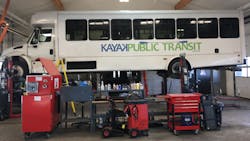Kayak Public Transit uses fleet management software to gain better control of fleet data
Operated by the Confederated Tribes of the Umatilla Indian Reservation, Kayak Public Transit provides transportation in 14 cities across four counties in Northeastern Oregon and Southeastern Washington. With community members relying on on-time transportation, an unexpected breakdown in Kayak’s fleet leaves those in its community stranded.
Vehicle maintenance and reporting made easy
Prior to onboarding with a fleet management software (FMS) system, Kayak Public Transit relied on physical documents to track vehicle data. Unfortunately, manual tracking created a bottleneck in communicating important issues and made tracking and analyzing data a headache.
“Everything was done manually — it was spreadsheets and hand-written work orders all [done] manually, all by hand, [and it] was not real efficient. It was time consuming, and there was a lot of opportunity for errors to be made,” explained Robert Johnson, fleet maintenance and safety manager for Kayak Public Transit.
Implementing an FMS allowed Kayak to streamline fleet-wide communication. Now, when drivers flag an inspection item as failed, Johnson is notified in real-time and an issue is created in the FMS, starting the workflow process automatically to ensure any maintenance needs are addressed in a timely manner. For issues that can be resolved in-house, Kayak can quickly create a work order, fix the problem and clear out the maintenance task. And when the agency needs to work with an outside shop, it can easily keep track of invoices and work history for each vehicle.
“We now have the flexibility to efficiently record, track and report on vehicle maintenance and operating activities,” said Johnson.
Its cloud-based FMS consolidates all data entered for robust reporting that’s easy to analyze and easy to locate. This has allowed Kayak to view maintenance reporting at different levels to determine when, where and by whom maintenance is performed.
“It used to be that when we wanted to know how many months it's been or how many miles it's been since we did a tire change on a vehicle, I would have to go back and dig through piles of handwritten work to try to find that information,” explained Johnson. “And now with [FMS], there are custom fields that we can set up to enter in any kind of information that we want. So I use that for tracking when tires were changed, when brakes were done. Every fall we record antifreeze protection levels, that sort of thing. And it's all right. It's very accessible, very easy to find.”
Functionality makes all the difference
When implementing previous software updates for other aspects of their business, Kayak found the training and onboarding either overly complicated or lacking in important details.
“We had a little bit of an issue with our information technology department,” Johnson said. “Every time that I thought I’d found a software that would be really good for us, they’d find a reason why they didn’t think it would work or was not compatible with our network.”
While security and compatibility were necessities in implementing a new software, Kayak’s additional functionality needs included a user-friendly interface, available training resources and efficient onboarding.
The IT team found its top choice of FMS after looking into cloud-based solutions, and Kayak took advantage of the free trial offered by its preferred FMS to test the platform for ease of use and to guarantee that it would meet all their reporting needs.
“We are beholden to the federal government, as well as the state government, to report on any number of things: the condition of our vehicles, our maintenance program, how often we're doing preventative maintenance and so on and so on,” Johnson said. “Beyond that, it's critical that we have a way to use the technology that we have [...] to help us know when things need to be done.”
The level of data tracking and reporting that the preferred FMS offered was a jumping off point, but Kayak soon found that setting up its account and training operators was easier than previous software implementations – and when it needed assistance, it was able to lean on the FMS onboarding and support teams. Additionally, the FMS’ responsiveness and library of resources eased many of the growing pains that come with new software.
Compliance, accounting and on-time maintenance
Outside of internal tracking and reporting, FMS has also streamlined the audit process for Kayak.
“We, as a public agency, have to answer to the Oregon Department of Transportation, Public Transit Division, as well as the Federal Transit Administration,” explained Johnson. “And when we're required to report on what we're doing, the information is all [in the FMS]. You have a robust reporting system. It's very easy to provide information to whoever needs to see it.”
Federal auditors provide Kayak with a checklist of attention items, and FMS allows them to review all fleet data immediately.
On top of compliance, Kayak must maintain monthly parts inventory records to submit to the Tribal government, who handles its accounting.
“We actually pay a certain amount of money to them every month to take care of those things for us. At the end of the month, we reconcile [our inventory and cost] to the penny,” Johnson said. “We have the ability to look at our inventory by bin location, parts used by vehicles, a lot of different ways we can slice and dice that to have some pretty effective and efficient controls over our inventory.”
After building out maintenance schedules in its FMS, Kayak has increased its on-time maintenance compliance to nearly 90 percent despite having only one person handling all fleet maintenance and management at the time. Furthermore, by tracking fuel, mileage, maintenance and more through an FMS, Kayak is now able to more accurately calculate its total cost of ownership (TCO) and spot errors in reporting before they escalate.
“In about every facet of our business, we found that the [FMS] has become a really integral and important tool in what we do,” said Johnson.
About the Author

Rachael Plant
Content Marketing Specialist, Fleetio
Rachael Plant is a Content Marketing Specialist for Fleetio, a fleet management software company that helps organizations track, analyze, and improve their fleet operations.
